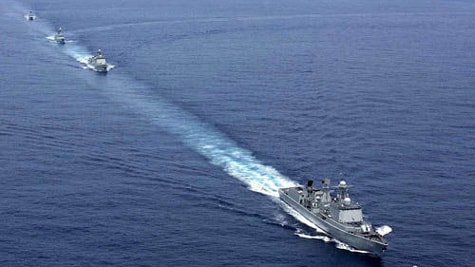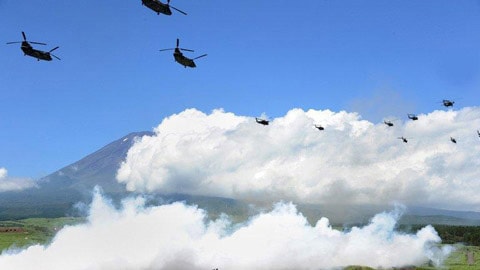Will Japan-China tensions turn into military "confrontation"?
Although it does not want a military conflict with Japan, China will continue to expand its range of operations at sea.
In recent weeks, the war of words between Japan and China has suddenly increased in both level and intensity, with many fearing that the verbal spat could lead to military conflict between the two Northeast Asian neighbors.
However, according to analysts, although the "verbal battles" between Tokyo and Beijing are taking place very tensely and both countries are making moves to strengthen their military strength, the possibility of a full-scale war between the two countries at the present time is not high.
War of words escalates
Japan-China relations have been strained since September last year after Tokyo decided to buy three of the five islets in the Senkaku Islands, which Beijing calls Diaoyu, from a Chinese businessman, citing the need to manage the islands in a “peaceful and stable” manner. Since then, despite efforts from both sides, Japan-China relations have not improved.
 |
| Chinese ships continue to enter the Senkaku/Diaoyu Islands area (Photo: China news) |
China has regularly sent ships and planes into the waters and airspace around the islands, which are administered by Japan, leading to war of words between diplomats and officials from both countries.
The frequency of verbal spats between Tokyo and Beijing suddenly increased in September 2013 after the Japanese Defense Ministry announced that it would consider shooting down Chinese drones that violated the airspace of the Senkaku Islands.
NHK quoted a statement from the Japanese Ministry of Defense affirming that if Chinese military drones "invade Japanese airspace", creating a situation that threatens the country's national security, Japan will consider shooting down Chinese drones.
Beijing immediately warned Tokyo. On September 17, Chinese Foreign Ministry spokesman Hong Lei affirmed that due to historical reasons, all moves by Japan in the field of military security are of great concern to the international community and neighboring Asian countries. China hopes that Japan will take history as an example, respect the concerns of countries in the region, do more things that are beneficial to regional stability and peace, stop creating and painting tense opposition, creating excuses to expand military equipment, and adjust military strategies.
It was thought that the incident would stop there, but in reality, the war of words between the two sides continued to escalate. According to AFP news agency, last week, Japanese Prime Minister Shinzo Abe gave the green light to a plan to shoot down any drone that did not obey warnings to leave Japanese airspace.
The information came after a drone entered southern Japanese airspace. Japanese lawmakers, in their individual capacity, said there was no doubt it was a Chinese aircraft.
China immediately reacted very strongly. On October 26, Chinese Defense Ministry spokesman Geng Yansheng affirmed: "We emphasize to relevant parties that the Chinese military's strong determination to protect territorial sovereignty should not be underestimated.
If Japan takes coercive actions like shooting down planes as they have said, (we will regard) it as a serious provocation, an act that could spark a war, and China will respond firmly. The provocative side will have to bear all the consequences of this action."
Responding to Beijing's threats, on October 27, Japanese Prime Minister Shinzo Abe warned Beijing not to use force to change the regional balance of power.
 |
| Japan strengthens defense activities (Photo: Kyodo) |
Speaking at an annual military exercise, Prime Minister Abe said: "There are increasingly provocative acts and statements that threaten national sovereignty. It can be said that the security environment surrounding Japan is becoming more complex and harsh. To affirm our goal and stance of not tolerating all acts of using force to change the situation, we must take many measures such as strengthening patrols and surveillance and gathering intelligence."
Previously, in an interview with the "Wall Street Journal", Prime Minister Abe said: "There are many concerns that China is trying to change the regional balance of power by force instead of relying on rules and principles." However, according to Mr. Abe, if China (really) chooses this direction, it will be difficult for them to rise peacefully.
Will the verbal spat turn into a military confrontation?
According to Kyodo news agency, October 27 – the day Prime Minister Abe made statements warning Beijing not to use force to change the regional balance of power – was the third consecutive day Japan deployed fighter jets in response to Chinese aircraft operating in international waters near the Okinawa Islands.
Earlier, two Chinese Y8 early warning aircraft and two H6 bombers flew from the East China Sea to the Pacific Ocean and back, but did not violate Japanese airspace.
"They were two early warning aircraft and two bombers. It is unusual to have so many aircraft flying in the area of Okinawa and Miyako Island. We consider it very unusual that this has happened for three consecutive days," said Japanese Defense Minister Itsunori Onodera.
Then, on October 28, the Chinese coast guard sent four ships to waters near Okinawa Island, just outside Japan’s territorial waters, and stayed there for two hours under Japanese surveillance. On October 29, two Chinese navy frigates entered the area.
Japan's military is on high alert and is planning major air and sea exercises in November to bolster and enhance its ability to secure its remote islands.
Although the war of words between Japan and China is extremely tense and the risk of military conflict between the two countries is increasing, according to analysts, neither Tokyo nor Beijing is ready to rush into an all-out war due to concerns about the consequences of such a war on the economy.
The Japanese economy is now beginning to recover from the March 2011 quake, but the recovery is still fragile. Tokyo needs a stable external environment to maintain that recovery. Meanwhile, Tokyo is also concerned that a military confrontation with Beijing could negatively affect its businesses in China.
For its part, China’s economic growth is slowing, leading many to worry that the world’s second-largest economy could be headed for a hard landing. China, therefore, needs a stable external environment to help its economy maintain its growth momentum.
In addition, Beijing is also concerned about the unpredictable consequences of foreign investment flows, especially from Japan, flowing out of the country in the event of a military conflict between the two countries. At a time when Japan and China are just politically tense, Japanese investment flows into China have decreased. Japanese statistics show that in the first 6 months of 2013, Japanese investment in China decreased by 31% compared to the same period last year to 4.93 billion USD, while its investment in Southeast Asia increased by 55% to 10.29 billion USD.
For these reasons, the two countries are trying to find diplomatic solutions to cool down the situation. According to Kyodo news agency, during his visit to China last weekend, former Japanese Prime Minister Yasuo Fukuda held talks with Chinese Foreign Minister Wang Yi. The two sides exchanged views on the Japan-China territorial dispute as well as the differences in views between Tokyo and Beijing on historical issues.
Previously, according to Kyodo news agency, on October 16, Japanese Chief Cabinet Secretary Yoshihide Suga admitted that earlier this month, a senior Chinese diplomat secretly visited Japan to conduct informal negotiations to improve bilateral relations.
Along with diplomatic channels, Japan and China are seeking to improve relations through other channels. According to NHK, China's Guangdong province is expected to send a delegation of about 50 local government officials and businessmen to Japan this month. This is the first time in a year that a Chinese province has sent such a large delegation to Japan.
The Guangdong provincial government suspended economic exchanges with Japan after anti-Japanese protests over the Senkaku/Diaoyu Islands spread across the country last September.
However, according to analysts, although China does not want a military conflict with Japan, it will continue to expand its scope of operations at sea. This will make it difficult for the tension in Japan-China relations to end in the near future./.
According to VOV






